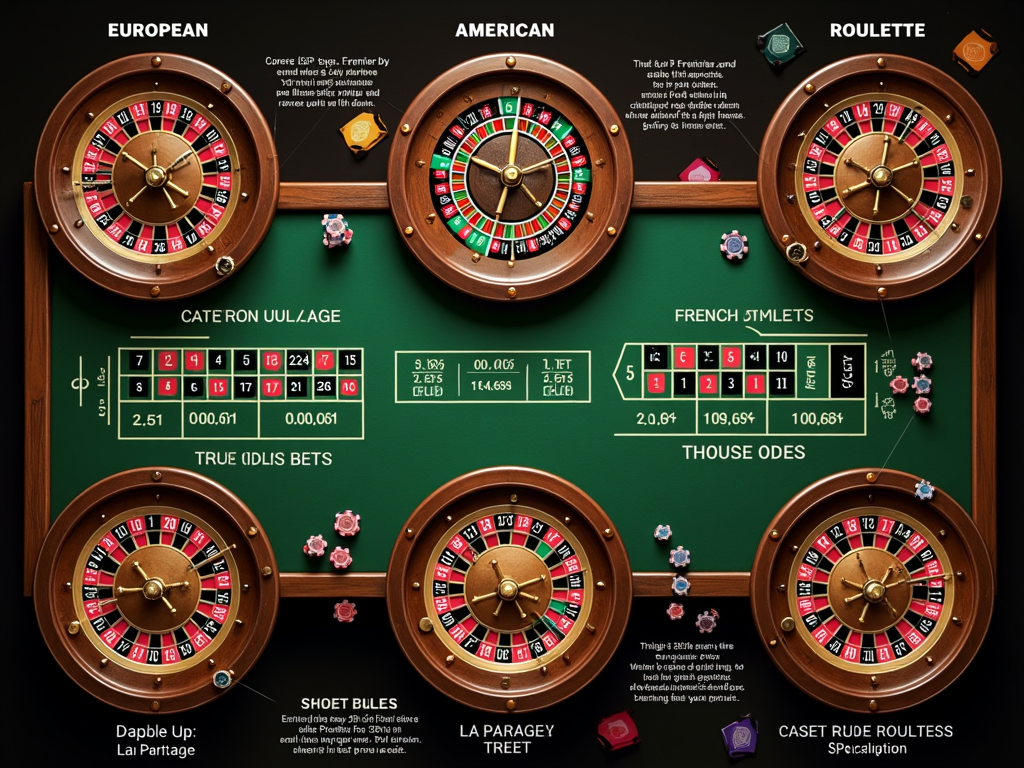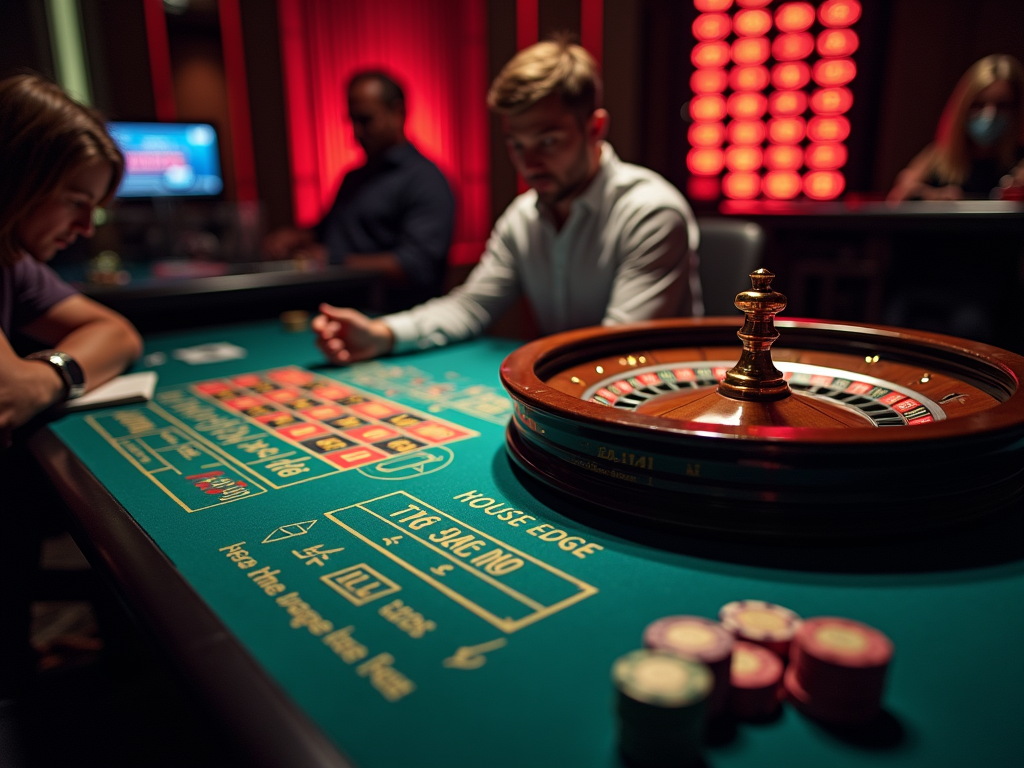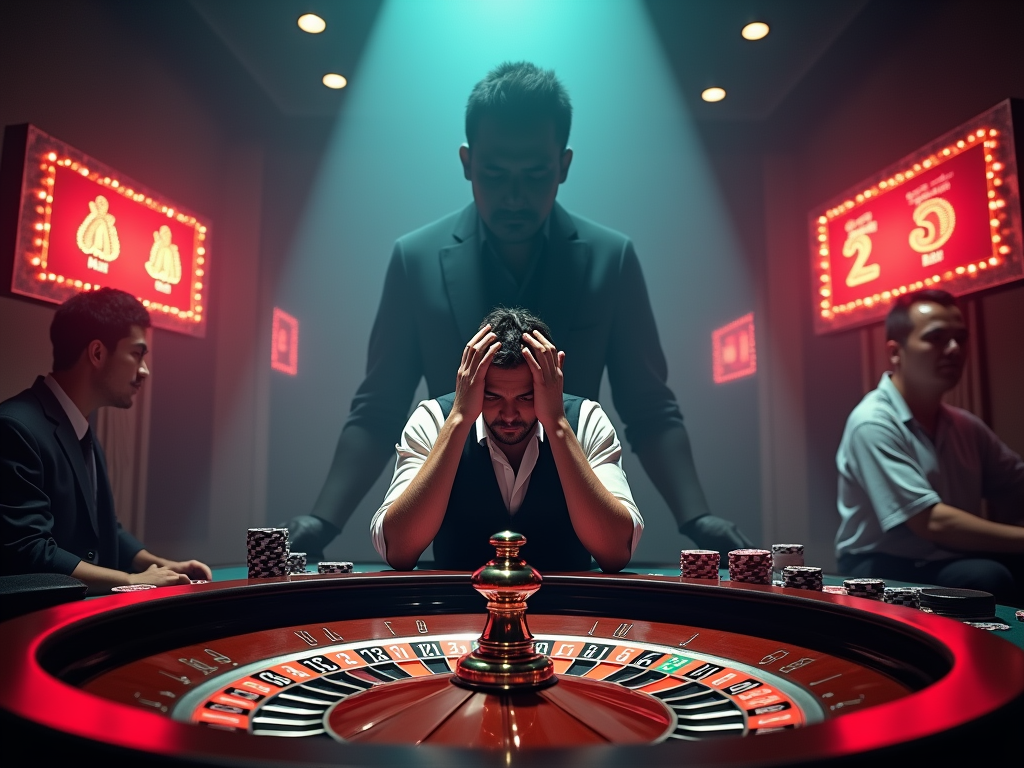Strategic Thinking in Roulette: Mathematics and Psychology
Roulette’s mathematical structure and psychological elements require strategic thinking to protect a player’s bankroll. The game’s built-in house advantages demand careful consideration before placing any bets.
Key Takeaways
- European roulette offers better odds with a 2.7% house edge compared to American roulette’s 5.26%.
- French roulette provides the most player-friendly rules with features like La Partage reducing the house edge to 1.35%.
- Betting systems and pattern tracking cannot overcome the built-in mathematical house advantage.
- Strong bankroll management with preset limits is essential for responsible gameplay.
- Emotional decision-making and chasing losses are major threats to maintaining control while playing.
Understanding the Mathematical Foundation
Successful roulette play depends on understanding core mathematical principles. The house edge varies significantly between game versions, with French roulette standing out as the most advantageous option due to its La Partage rule. This rule allows players to recover half their bet on even-money wagers when zero appears, reducing the house edge.
Basic probability calculations show that no betting system, including Martingale or Fibonacci, can defeat the inherent house advantage. Each spin of the wheel is an independent event, meaning pattern recognition is ineffective as a long-term winning strategy.
Bankroll Management and Emotional Control
Setting strict bankroll limits before playing serves as the foundation for responsible gambling. This proactive strategy helps prevent impulsive decisions driven by emotions rather than logic. Players should set a limit they are comfortable losing and never exceed it during a gaming session.
The key lies in accepting that roulette is primarily a game of chance. By combining this acceptance with solid money management strategies and emotional control, players can better protect their financial resources while maximizing enjoyment of the game.
Why the House Always Wins at Roulette
The house edge in roulette sits at the core of why casinos maintain their profit margin. I’ve found that understanding these built-in advantages helps players make smarter betting choices when they play roulette at online casinos.
Different Roulette Variations and Their House Edge
Each roulette variant comes with its own house advantage percentage. European roulette features a single zero pocket, creating a 2.7% house edge. American roulette adds a double zero pocket, pushing the house advantage up to 5.26% – making it a less favorable option for players.
French roulette stands out as the most player-friendly version. Its special rules like La Partage and En Prison cut the house edge to 1.35% on even-money bets. These rules return half your stake if the ball lands on zero during even-money bets.
Here’s how the true odds compare to actual payouts in roulette:
- Straight Up Bet (Single Number): True odds 37:1, Actual payout 35:1
- Split Bet (Two Numbers): True odds 18:1, Actual payout 17:1
- Street Bet (Three Numbers): True odds 11.67:1, Actual payout 11:1
- Corner Bet (Four Numbers): True odds 8.5:1, Actual payout 8:1
- Six Line Bet (Six Numbers): True odds 5.33:1, Actual payout 5:1
The difference between true odds and actual payouts creates the mathematical advantage that keeps casinos profitable. This gap exists across all bet types, ensuring consistent casino profits over time.
The single zero in European roulette affects 37 possible outcomes, while American roulette’s additional double zero increases this to 38 possibilities. This small change significantly impacts winning chances, making European roulette a better choice for players looking to extend their bankroll.

The Truth About Betting Systems and Pattern Hunting
Understanding Betting Systems and Their Limitations
I’ve seen countless roulette players fall into the trap of betting systems, particularly the famous Martingale strategy. While these systems might seem foolproof at first glance, they’re actually quite dangerous for your bankroll. Let me break down the harsh reality of the Martingale system: starting with a $5 bet, you’ll need to bet $10 after one loss, $20 after two losses, $40 after three losses, $80 after four losses, and a whopping $160 after five consecutive losses. That’s $315 risked just to win your initial $5 back.
The math behind betting systems can’t change one simple fact — each spin is completely independent of the last. This leads us to one of the most common traps in roulette betting strategies: the gambler’s fallacy. Just because red has appeared five times in a row doesn’t mean black is “due” to hit. The wheel has no memory, and each spin starts fresh with the same odds.
The Reality of Pattern Tracking
Pattern tracking is another misleading practice I often notice at roulette tables. Players meticulously record numbers, thinking they can predict future outcomes based on past results. Here’s what you need to know about why this doesn’t work:
- Modern roulette wheels, especially in online casinos, use Random Number Generators (RNGs) that ensure complete randomness
- Previous results have zero influence on future spins
- Hot and cold numbers are simply random clusters that appear in any sequence of random events
- Table displays showing recent numbers can create an illusion of patterns where none actually exist
The house edge remains constant regardless of your betting system or pattern tracking method. In European roulette, it’s 2.7%, and in American roulette, it jumps to 5.26% — no betting strategy can eliminate these built-in advantages.
Before you stake your money on any betting system, consider this: if these systems really worked, casinos would have gone bankrupt long ago. Instead of chasing patterns or doubling down after losses, I recommend setting strict betting limits and viewing roulette as entertainment rather than a way to make money.

Smart Money Management: Your Best Defense
Setting Up Your Bankroll Strategy
I’ve found that proper bankroll management is crucial for any roulette player looking to maintain control and enjoyment at the tables. The key is breaking down your total session budget into smaller betting units. For instance, if I start with $200, I’ll divide it into 40 $5 betting units, giving me enough cushion to ride out the game’s natural ups and downs.
Let me share some essential bankroll rules that can help protect your funds while playing roulette at online casinos:
- Set both loss and win limits before starting – for example, stop playing after losing 50% of your bankroll or winning 50% above your starting amount
- Use only disposable income you can afford to lose
- Stick to one betting unit size throughout your session
- Never borrow money or use credit cards to fund gambling activities
- Track your wins and losses to maintain awareness
- Take regular breaks to assess your bankroll status
Smart bankroll management means recognizing red flags that signal it’s time to step away. If you’re dipping into funds meant for bills, chasing losses by increasing bet sizes, or feeling emotional about losses, these are clear signs to stop playing immediately.
I recommend treating roulette as entertainment rather than a way to make money. By setting clear boundaries for losses and wins, you’ll maintain better control over your gambling experience. Remember to celebrate your wins by cashing out some profits and never risk more than your predetermined session budget.

Understanding Roulette Odds and Probabilities
The Truth Behind Roulette Odds
Learning to master roulette betting strategies starts with understanding the real odds behind each bet. The odds for hitting a single number (straight-up bet) are 36:1 in European roulette and 37:1 in American roulette, yet casinos only pay out 35:1. This difference creates the house edge that makes roulette profitable for casinos.
Even-money bets like red/black or odd/even offer better winning chances but still favor the house. In European roulette, you’ll win these bets 47.4% of the time, while American roulette drops to 46.3% due to the extra double-zero pocket. This small percentage difference makes European roulette a better choice for players looking to stretch their bankroll.
Inside vs Outside Bets: Risk and Reward
Inside bets offer higher payouts but carry greater risk. Here’s what you need to know about the most common betting options:
- Straight-up bets (single number): Highest payout at 35:1, but only 2.7% chance of winning
- Split bets (two numbers): 17:1 payout with 5.4% probability
- Corner bets (four numbers): 8:1 payout with 10.8% chance of success
- Six-line bets (six numbers): 5:1 payout with 16.2% probability
Outside bets provide more frequent wins but smaller payouts. Column and dozen bets pay 2:1 with a 32.4% chance of winning, while even-money bets like red/black give you nearly 50% probability but only double your money on wins.
I find that many players don’t realize how the pay structure consistently benefits the casino. For every $100 wagered on even-money bets in European roulette, the house expects to keep $2.70. This percentage increases to $5.26 in American roulette, making it clear why choosing the right version matters for long-term play.
How to Choose the Right Roulette Variant
Understanding Different Wheel Types
Picking the right roulette variant can make a significant difference in your winning potential. I’ve found that many players don’t realize how the number of pockets impacts their chances of winning when they place bets at the roulette table.
European roulette features 37 pockets, including a single zero, while American roulette has 38 pockets with an extra double zero. This seemingly small difference actually doubles the house edge in American roulette to 5.26%, compared to European roulette’s 2.7%. That’s why I always recommend choosing European roulette when possible.
Exploring French Roulette Benefits
French roulette takes things further by offering player-friendly rules that can cut the house edge even more. The La Partage rule returns half your stake on even-money bets when zero hits, reducing the house edge to just 1.35%. The En Prison rule gives you a second chance by letting your even-money bet ride if zero appears.
Here’s what to look for when selecting a roulette game:
- Single zero wheel (European/French) instead of double zero (American)
- La Partage or En Prison rules availability
- Clear table minimums and maximums that match your budget
- High-quality wheel maintenance in land-based casinos
- Reputable software providers for online games
Smart variant selection combines better odds with rules that protect your bankroll. By choosing European or French roulette over American versions, you’re immediately improving your chances of success at the table.
The Psychology of Roulette Losses
Losing at roulette can trigger intense emotional responses that cloud judgment and lead to poor betting decisions. I’ve seen countless players fall into destructive patterns after a few losses, letting their emotions take control of their gambling choices.
Understanding Emotional Betting Triggers
Casino environments are specifically crafted to influence your betting behavior. Those bright marquee displays showing “hot” and “cold” numbers can trick you into thinking there’s a pattern – but in roulette betting strategies, each spin is completely independent.
Going on “tilt” – a state where emotions override logical thinking – is one of the biggest threats to your bankroll. Here are the common emotional traps I’ve identified:
- Chasing losses by increasing bet sizes to recover previous losses
- Believing in “due” numbers that haven’t hit in a while
- Making impulsive bets out of frustration or anger
- Ignoring predetermined betting limits when emotions run high
- Staying at the table too long hoping for a “lucky streak”
The urge to chase losses is particularly dangerous because it often leads to even bigger losses. I’ve found that taking regular breaks helps maintain emotional control and prevents tilt from setting in. Setting strict loss limits before playing is crucial – once you hit that limit, it’s time to walk away.
Viewing roulette as entertainment rather than a way to make money helps create a healthier mindset. When you’re playing for fun rather than profit, those inevitable losses become easier to accept. Remember, the house always has an edge – no amount of emotional betting will change that mathematical reality.
The key is recognizing these psychological triggers before they impact your decision-making. If you feel frustration or anxiety building, step away from the table. Taking time to cool off and reset emotionally is vital for responsible gambling.

Sources:
Wizard of Odds – Roulette Guide
Casino.org – Common Roulette Mistakes and How to Avoid Them
John Scarne – Scarne’s New Complete Guide to Gambling
Investopedia – Gambler’s Fallacy Explained





